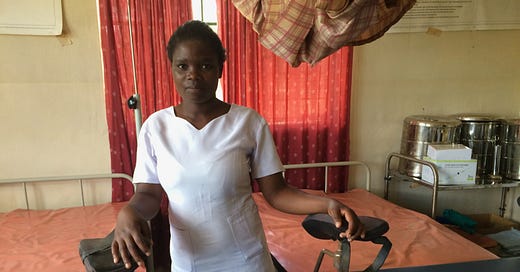Being born and giving birth in rural Malawi can be dangerous for both mother and child
Traditional midwives work alongside trained health staff to deliver more than 600,000 babies a year.
The labour ward in Machinjiri Clinic (2019)
There are around 1,700 babies born every day in Malawi. Over 600,000 a year. Some will die only hours after drawing their first breath. Many more will die before their first birthday. Around 70 of those babies born each day will not reach their fifth birthday. The tiny, malaria-infected mosquito will kill some, fever and diarrhoea others. Measles is a common killer, as are respiratory diseases. And sepsis is on the increase, a humanitarian disaster in a country where antibiotics are scarce.
It is not just newborn babies who are at risk of dying. Malawi is one of the most dangerous places in the world for a woman to give birth, despite significant progress made in maternity care in recent years. Twenty years ago, one woman in 90 died giving birth. The latest figures from 2016 show a fall of more than a half, but still one in 200 are dying. This revolution came about because women are now encouraged to give birth in their nearest clinic, rather than at home with a traditional birth attendant. The government banned the use of these village midwives in 2007 but, somewhat surprisingly, the decision was reversed three years later.
Mother advisors
However, women are now actively discouraged from using their services. Many local chiefs impose a fine of a chicken or a goat on women who use them rather than go to a clinic. But in a country where there are only 3,400 registered midwives against a required 23,600, village midwives still have a role to play, provided they are properly trained. International charities, such as Christian Aid, work with Malawi’s Ministry of Health to help the women change their role from midwife to ‘mother advisor’.
Now, instead of delivering a baby on a straw mat on the dirt floor of a village house, armed with nothing more than a plastic bag, a reel of cotton and some water, the women encourage pregnant women to get HIV testing, refer them to the local clinic for proper ante-natal care, and even accompany them while they give birth in the hospital. Some, however, have reluctantly retired




